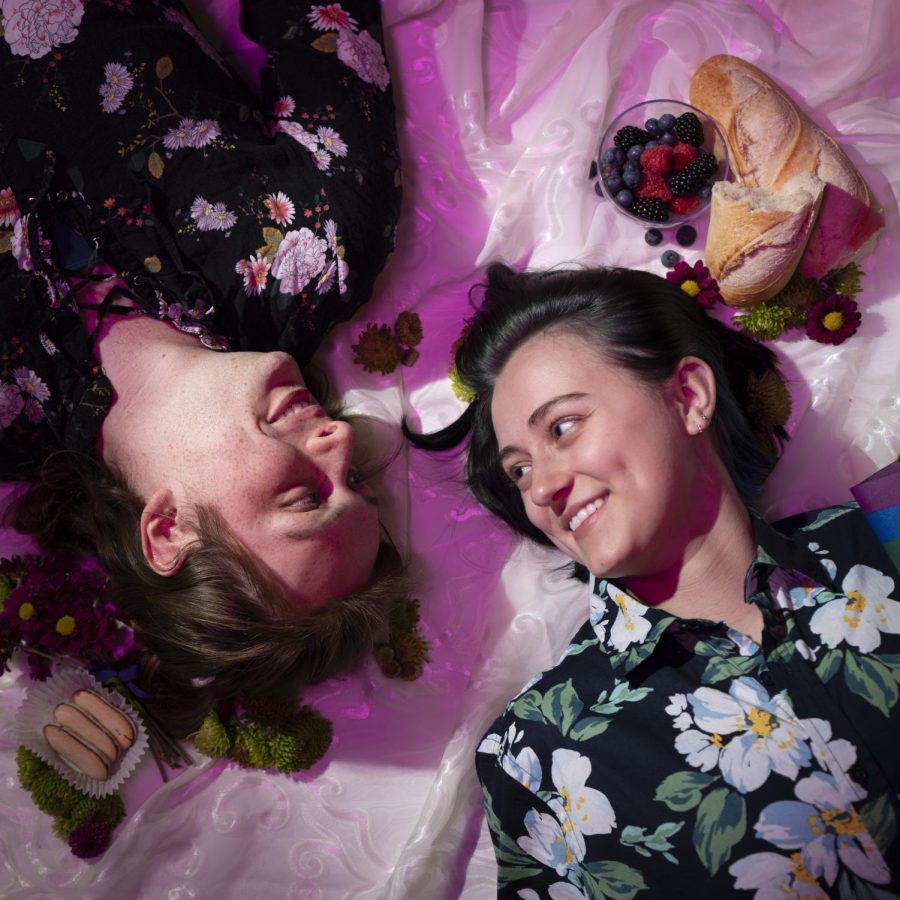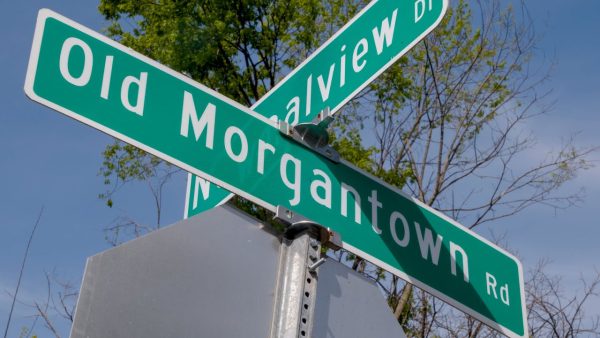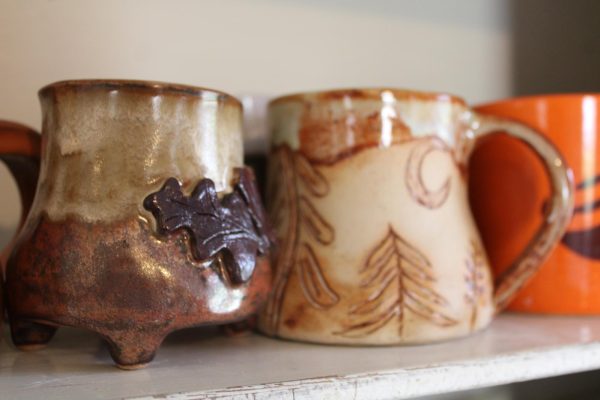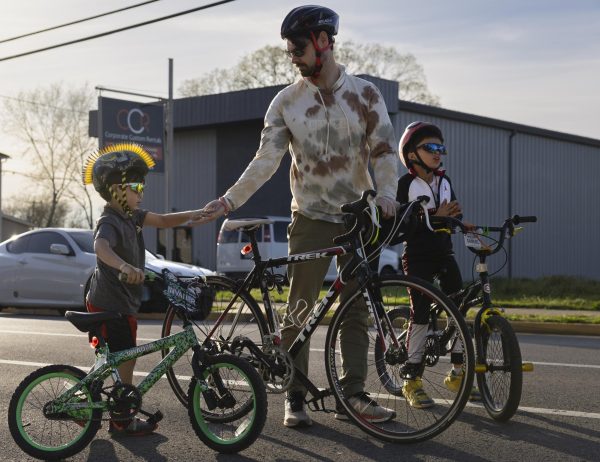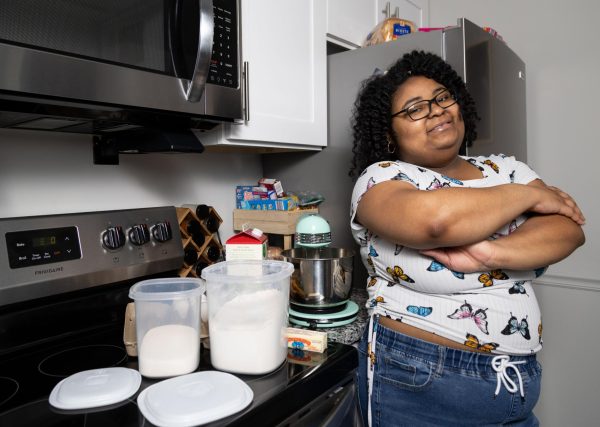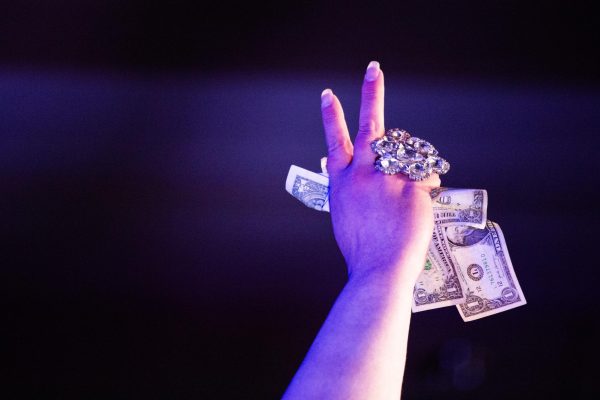WKU students showcase rainbow of relationships
Rome Doddema (left) and Sumeja Hrnjic (right) take part in a picnic photoshoot on April 21, 2022. Rome is a transgender woman and Sumeja is non-binary.
April 27, 2022
As the world progresses through the 21st century, relationships have morphed, changed and even been challenged. WKU students are no strangers to pushing back against established relationship norms.
Same-sex relationships, heterosexual relationships and even relationships that thrive in the between area can be found in abundance around the Hill. Hilltoppers all around the campus community are proving that relationships are not one-size-fits-all. You may find that classmates, peers and friends are constantly challenging the norms.
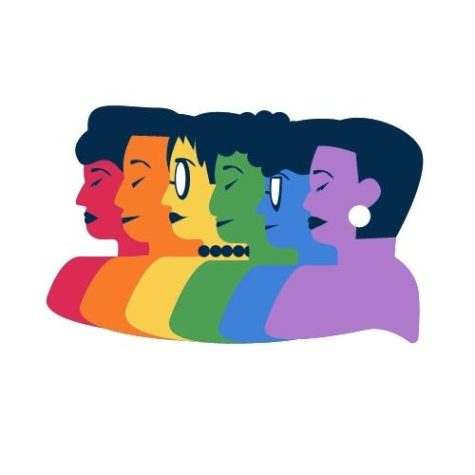
Tessa Duncan (She/Her) & Hailey Robertson (She/Her)
Tessa Duncan is a junior at WKU majoring in Nursing, and her partner is Hailey Robertson, another junior who studies theater.
They met each other in an all-girls Catholic high school in the Louisville area.
“We actually started talking in religion class,” Duncan said. “We started talking one day in class and then she came to my car after school, before
I had practice, and we talked from 2 o’clock till 7, before I had to go to practice, and have been together ever since […] I hate to call it a courtship, but that’s kind of how it felt because I was so forward in my intentions.”
As of January, Tessa and Hailey have been together for three years. Duncan said coming out was difficult for her.
“My dad’s brother is gay so he did a lot of the work for me, which I appreciate, in that side of the family so they’re much more accepting,” Duncan said. “My mom would ask me if we were going to break up often. She would always ask me if I’m keeping my options open.”
Robertson said her family is “super accepting” and loves Duncan. Duncan has “mixed feelings” about putting herself into any one category.
“I think I stick with queer,” Duncan said. “I would say that I’m bisexual but I don’t foresee where I’m not with [Robertson]. I think queer is the best label for me right now.”
However, Robertson is more comfortable applying a label to herself. When she first came out she “strictly” identified as bisexual, but over time she began to more closely identify as lesbian.
Being out in public as a couple, the two said they are not very “vocal” about their relationship.
“I don’t know if I’d feel comfortable [being openly affectionate] in any other area other than downtown Louisville,” Duncan said.
Robertson said she and Duncan were verbally assaulted at a gas station last year when she gave Duncan a
kiss before going to pump their gas. Men began shouting “did you just kiss her?” to Robertson who, out of fear, got back into the car and drove away without getting gas.
“That set us back from being any sort of touchy in public,” Robertson said.
All-in-all, they came to the conclusion that being open and out comes down to individual comfort levels.
Mitch (He/They) & Jordan (He/ Him)
Mitch and Jordan are another couple who met each other in their Catholic high school days.
The couple requested that their last names not be included in this story due to the fact that one of them is not out to their family yet.
Mitch is a WKU student from Lebanon, Kentucky. Jordan, his partner, does not attend WKU, but goes to school in eastern Kentucky.
Mitch and Jordan met because they had friends that were in the same circles.
“We sort of knew each other through mutual friends but then we both got into the same class together and that’s where we went from knowing each other to being friends,” Jordan said. “It sort of developed into a crush on both ends.”
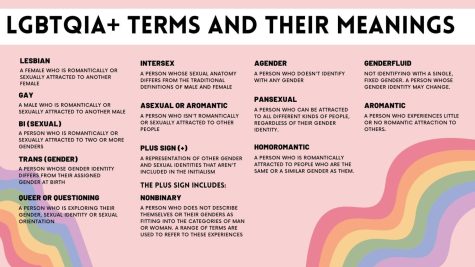
During their junior year of high school, the two attended a party together and Mitch asked Jordan the status of his attraction. Jordan said that’s when he realized he loved Mitch.
Since then, Mitch and Jordan have been in a three-year long committed relationship.
Jordan said being in a pseudo-long distance relationship has not affected their bond, because after high school and going through a pandemic, they are accustomed to having little one- on-one alone time. Even when they are apart, they keep in contact with each other.
“We keep communicating every single day, day in and day out,” Jordan said. “I am able, thankfully, [to] make the three-hour drive down to Bowling Green. It’s worth it every single time.”
Thanks to the transition from high school to college, Jordan said he has found an environment that is more complex and diverse.
Mitch said going to a Catholic high school subjected them to some discriminatory situations, but he agrees coming to college was an “eye opening experience.”
“There’s a very good community out here of people who will support you and love you for who you are,” Mitch said. “It’s very nice to be talking with people and [be able to say] ‘yes, I am in a relationship.”
Mitch said he is not visibly out while on campus, but that does not mean he is shy about telling those who ask.
“If somebody asks, I’m gonna tell the truth,” Mitch said. “It’s not a secret. It’s nothing to hide. It’s just a fact about me. [It’s] nothing different than my interests. It’s just a part of my identity. Like I’m 5-foot-5, and I’m also bisexual.”
Even though one of them is not out to their family, that does not negate the positive aspects of their relationship. Jordan said being with Mitch has made the past three years “very good.”
Jordan and Mitch both agreed that college has given them the freedom to express their relationship in ways not fully possible in their home lives.
Grace Salloum (She/Her) & Logan “Loey” Rice (She/They)
Much like Mitch and Jordan, Grace Salloum agrees being in college has given her a degree of freedom in her relationship.
“I may be flashy about it here, but honestly it’s just because I’m finally happy that I can say things about my sexuality without having to put a joke behind it,” Salloum said. “It is much better here [than at home]. I can surround myself with people who do want to celebrate that part of myself.”
Salloum, a junior at WKU, studies psychological sciences and criminology with a minor in the Arabic language.
Salloum said she has settled into using queer as her preferred label. “I know there are a lot of people who have baggage with [queer] being used towards them in a derogatory way,” Salloum said. “I find it to be a very open label for myself.”
Coming from a small “village” north of Columbus, Ohio, Salloum said home was “quite difficult” for her. She said the f-slur was used regularly towards her.
“A lot of people [back home] just had a lot of horribly derogatory things to say about me or my partner,” Salloum said. “I had desensitized myself to those names because I had already gotten the racial slurs pretty early on so I was like, ‘what’s one more?’ It was very disheartening to me […] It didn’t make me feel safe to say almost anything at all.”
Salloum downloaded Tinder as a way to see if anyone she knew from her hometown had come out since she had left for college.
“When I went home for the summer I had Tinder, mostly not to date, because I knew a long distance relationship would be complicated,” Salloum said. “My now-girlfriend was a popular user and, at random, I super-liked them and we ended up matching.”
That user’s name was Logan “Loey” Rice. Salloum and Rice have been in a committed long distance relationship for roughly eight months.
Currently, Salloum said, her parents are unaware she is dating Rice.
“They don’t know that I’m in the relationship that I’m in because my mom issued a challenge; she said that I can’t both be excelling in school and also focusing on a relationship,” Salloum said. “So I’m going to try to end this year with straight A’s again and go back home and tell her that I did it in a relationship.”
Rice is currently not a WKU student, Salloum said. They are not a student anywhere as they are focusing on their family.
Rice comes to visit Salloum quite frequently to get the “college experience” on campus, but Rice is needed more at their home than at school. Rice comes to visit Salloum on campus roughly once a month. Rice does not drive, instead taking a bus down to Bowling Green.
“I often feel bad about how long the bus ride is and how bad the conditions [are],” Salloum said. “So, I do not ask as often. If it were up to her, she’d come down every single weekend, but I couldn’t do that to her.”
Salloum said not having her partner nearby all the time is actually beneficial to her and her education, even though it is unfortunate to only see Rice through remote means or in person very sparingly.
“I do think there are a lot more benefits than people would think with a long distance relationship,” Salloum said. “I feel like I can more justifiably equivalate my time between school, friends, myself and a partner. If I had a partner who was a two-minute walk away from me, or was constantly with me, I have a very strong fear that I would skew my priorities and spend a little bit too much time on one.”
Salloum and Rice’s first date was going to be at the Columbus Zoo back in August of last year, but due to complications in their schedules, the date ended up not working out.
In December, when Salloum went back home for winter break, the two of them tried to set up another date.
“I asked if she wanted to go to the zoo lights because that’s a really big thing as well,” Salloum said. “We were able to get the tickets to finally be able to see each other at the zoo lights.”
Due to Salloum’s apprehension about going on a date for the first time in a while, both Salloum and Rice brought a friend with them.
“We had kind of hung out in a group but also separate as well, just so that we could be able to adjust to speaking to each other in person,” Salloum said. “It is, honestly, one of the happiest moments I have experienced thus far.”
She said it is “ecstatic” to go from feeling self conscious to knowing the person you like wants to be with you too. In her ramblings and even in silence, Salloum is comfortable with Rice.
Salloum said she is “extremely” out while on campus. Salloum enjoys being out in college because she had to be “embarrassed” about her identity high school and back at home.
Michaela Snyder (She/Her) & Elizabeth Roth (She/Her)
Unlike Duncan and Robertson and Mitch and Jordan, who met before coming to WKU, Michaela Snyder and Elizabeth Roth met each other at the H4 Honors Retreat the summer before their freshman year.
Snyder is a junior studying computer science and linguistics. She is from Louisville, Kentucky.
Her partner, Elizabeth “Lizzy” Roth, is a junior from Murfreesboro, Tennessee studying creative writing with a minor in communications.
Despite first meeting at H4 all those years ago, Snyder and Roth have only been together for roughly a year and a half due to misinterpretations on both of their parts.
“We had a crush on each other for basically a year before we started dating and we were just too afraid to tell each other,” Roth said.
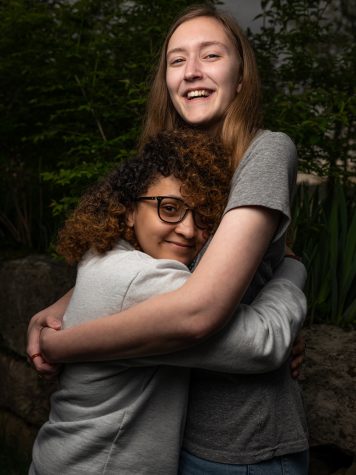
“So we spent an entire year just flirting with each other and sending compliments to each other,” Snyder said.
Both of their families know Snyder and Roth are together, but Roth’s extended family and grandparents do not. Mostly, Roth said, it is her own anxiety that makes her scared to come out to them.
Snyder has an older sister who is married to a woman. She said this made it easier for her to come out to her family.
“My older sister is also bi, and she’s nine years older than me, so I kind of knew it would be okay to come out,” Snyder said. “Everyone was fine with her coming out, so I knew it would be safe for me too.”
In terms of labels, Snyder and Roth say they are most closely aligned with being bisexuals.
Save for a few instances, Snyder and Roth haven’t had any major issues because of their relationship.
“A lady, from her car behind us, saw us holding hands and she glared at us,” Roth said. “There’s this one time we were in Blaze Pizza and we were talking about the eulogy that we’d give for each other if we died…and I was like ‘I’d tell everyone that you were the best girlfriend.’ The person behind us gave us this glare like ‘I cannot believe they talk about dating in public.’”
Roth said she knows of certain people that would not be positive if she was to come out to them. Because of this, Roth has told people
that she has a boyfriend named “Michael” because having a girlfriend in that “highly Christian” part of Tennessee is “out of the realm of possibility.”
“So Michaela is Michael to them,” Roth said.
Roth said she is not a“huge fan of public displays of affection in any relationship, but they will occasionally hold hands while walking through campus. They both say they feel safe at WKU and have surrounded themselves with accepting people.
Ashley Austin (She/Her) & Rachael Prewitt (She/Her)
In contrast to Roth and Synder, Ashley Austin and Rachael Prewitt are very PDA-friendly in their relationship, holding hands for the duration of their interview.
“We hold hands and kiss each other’s foreheads in public,” Prewitt said.
Prewitt is a senior at WKU majoring in performing arts with a concentration in theater design and technology with a minor in arts administration.
For the past year she has been in a relationship with Austin, a sophomore, pursuing a bachelor’s in performing arts and in Spanish.
Austin, from the Nashville area, and Prewitt, from Lexington, have a long-distance relationship over breaks, but they say it isn’t so bad. They’ve made a plan to work through the problem.
“We trade off on visiting each other,” Prewitt said. “I would go there or she would come here. It just depends on our schedules. It still sucks [though].”
Austin said she has plans to move to Bowling Green over the coming summer to remedy this.
Austin identifies as asexual, but that does not mean she is anti-sex.
“That doesn’t mean you’re sex-repulsed,” Austin said. “For asexual people, sex is like cake. If you get it, cool. If you don’t get it, it’s not the end of the world.”
Austin identifies as homoromantic, meaning she experiences romantic attraction to the same sex.
Prewitt said she identifies as a lesbian. Austin said she was very up front at the start of their relationship that she was asexual, a fact that Prewitt readily accepted.
“At the beginning of our relationship I was pretty open with [Prewitt] about the fact that I don’t know if I’ll ever want to have sex,” Austin said. “It’s not something I’ve completely ruled out, [but] it’s just something I don’t know if I’ll ever be comfortable with or not. She was like, ‘it’s okay, we’ll take it as we go. That’s not a problem for me.’”
The pair met in a Zoom call in September 2020, Austin’s freshman year, that was held by the dance and theater department.
“The theater and dance department did these Zoom plays, and all the rehearsals were done through Zoom,” Austin said. “So, that’s where we found out about each other because I was an actor in one of the shows she staged-managed.”
Since it was the COVID-19 semester, it was not until the following January that they first met in person. They got to know each other through Snapchat before Prewitt drove to Nashville to meet Austin.
“I was insanely nervous because I just genuinely had never liked a person this much [and] like so quickly,” Austin said. “She got there and I was like ‘Oh my god, you’re real. And we hung out all day.”
Fortunately, for Austin and Prewitt, they said their coming out experiences went well with their families.
Austin’s family has been very supportive. Especially her mother, who is a devout Christian. Austin is very grateful for that as it has taught a valuable lesson about Christianity.
“Often the Christian community is a place of fear for a lot of the LGBT people, so having her as a pillar of strength and reassurance that those two can coincide,” Austin said. “You can be Christian and be gay, which has been really important for me.”
As a couple on WKU’s campus, the two agree they feel comfortable and supported.
They’ve never felt afraid and no one has ever come up to them and said something offensive, but they said from time to time they feel awkward and people may give them weird glances.
“It’s just weird vibes sometimes,” Austin said.
Ray Saul (She/They) & Cameron Caskey (They/Them)
Another couple who met on social media was Ray Saul and Cameron Caskey.
Saul is a WKU student from the Louisville area majoring in criminology and psychology. She is the current education and public outreach director at the Queer Student Union.
Saul is in a relationship with Cameron Caskey, another WKU student majoring in psychology and political science
Saul identifies as pansexual, meaning she does not choose dating partners based on gender, biological sex or identity. Saul also identifies as genderfluid. Caskey goes without defining themselves under any one term.
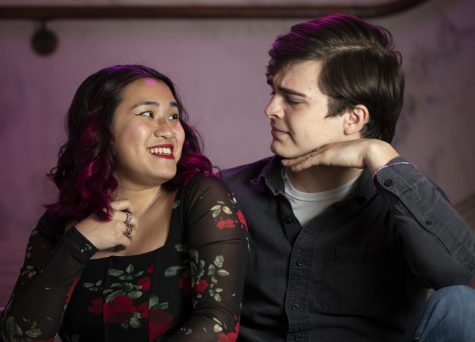
“I really don’t put any labels on myself because I don’t know what fits best,” Caskey said. “In high school, everything was super pressed, it was like trying to be masculine for the sake of fitting in. I don’t enjoy feeling like I’m being perceived as just a man, and I don’t like whenever people use terms strongly associated with masculinity towards me, because it just doesn’t feel like me.”
Despite their non-normative identities, Saul said she and Caskey are often mistaken for a heterosexual couple in public.
“A lot of the people who don’t know Cameron very well will use he/him pronouns for them, but I try to slide it [into] conversation like, ‘yeah my partner’. That kind of establishes that they are not my boyfriend,” Saul said. “I’ve had problems with people being like, ‘I don’t get why they don’t use boyfriend’ or ‘what’s the reason behind ‘partner’?’Well, they’re not male. It’s complicated.”
Saul tells her parents she is bisexual because she “doesn’t feel like trying to explain pansexuality to them.”
While at home, Saul said she has to misgender Caskey because her parents don’t understand that aspect of gender nonconformity,
“I accidentally said they/them when addressing Cameron to my parents and my mother went off on this whole tangent,” Saul said.
Saul and Caskey met on the dating app Bumble, where Saul was originally just looking for friends.
“I matched with their ex-girlfriend first before I matched with them,” Saul said. “Actually I was dating someone else [at the time], but we started seeing each other more when my ex and I broke up last fall, and then we officially put a label on [the relationship] this past February.”
Saul said the pair has the “privilege” of passing as a straight couple when in public, which allows them to feel safe. Saul was also a member of a sorority before leaving for a variety of reasons.
“When I was involved with Greek life, even though I would openly talk about my partner, I would use they/them [pronouns], but they would still say ‘he’ or ‘your boyfriend’. I don’t think [they] were quite getting it,” Saul said.
Both Saul and Caskey said they spend a lot of their time at The Pride Center, a place that Caskey said offers a safe place for everyone.
“Anyone who goes to the Pride Center has a story to tell for themselves,” Caskey said. “They’re all comfortable expressing themselves in the Pride Center. It’s really nice.”
As an editorial member of the QSU, Saul has helped provide students a safe space to feel open and accepted.
“People are a lot more open in relationships and also able to talk about it,” Saul said. “It’s all about being able to present and act like a couple, and not just introduce them as a friend and worry about people judging them.”
In the end, Patrick Collins, faculty adviser for QSU, summed up non-heteronormative relationships best.
“Each is very different, having their own rules and layers to the inner workings of the relationship,” Collins said in an email. “Not one is really any different from our heterosexual counterparts, dates, hanging out and personal interactions. Mostly, the students just want to have someone that loves and cares about them. Many lacked that from families that disowned them or peers that outcasted them.”
News Reporter Michael Crimmins can be reached at [email protected]. Follow him on Twitter @michael_crimm.

